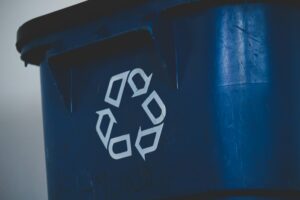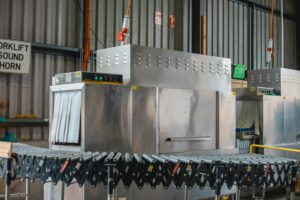In our current linear economy, waste is a significant environmental challenge. However, transitioning to a circular economy offers a promising solution. A circular economy aims to minimise waste generation and maximise resource efficiency by keeping materials in use for as long as possible. Implementing eco-friendly waste management solutions is key to achieving this vision. In this article, we will explore innovative approaches and strategies that promote sustainable waste management practices, contributing to a circular economy and reducing the burden on our environment.
 Embracing the Three R’s: Reduce, Reuse, and Recycle:
Embracing the Three R’s: Reduce, Reuse, and Recycle:
At the core of a circular economy lies the principle of the three R’s: reduce, reuse, and recycle. To minimise waste generation, businesses and individuals should focus on reducing consumption and avoiding unnecessary packaging. Promoting the reuse of products and materials through repair, refurbishment, and sharing platforms helps extend their lifespan. Additionally, establishing robust recycling systems and educating the public about proper sorting and recycling practices are crucial steps towards achieving a circular economy.
Implementing Waste-to-Energy Technologies:
Eco-friendly waste management involves harnessing the potential of waste as a valuable resource. Waste-to-energy technologies offer an effective solution by converting non-recyclable waste into clean energy. Technologies like incineration with energy recovery and anaerobic digestion can extract energy from organic waste, reducing reliance on fossil fuels and curbing greenhouse gas emissions. By adopting these technologies, we can transform waste into a valuable asset while addressing energy demands in a sustainable manner.
Promoting Composting and Organic Waste Management:
Organic waste, such as food scraps and yard trimmings, constitutes a significant portion of our waste stream. Implementing composting initiatives at individual, community, and industrial scales can divert organic waste from landfills and create nutrient-rich compost for soil enrichment. Encouraging households, businesses, and municipalities to separate organic waste for composting fosters resource recovery and reduces greenhouse gas emissions associated with landfilling.
Advancing Product Design for Circularity:
To achieve a circular economy, product design plays a pivotal role. Businesses should strive for eco-design principles that prioritise durability, recyclability, and ease of disassembly. By incorporating recycled materials and designing products with a focus on resource efficiency, companies can contribute to closing the loop and minimising waste generation. Collaboration between designers, manufacturers, and waste management stakeholders is crucial in creating products that align with circular economy principles.
 Investing in Advanced Recycling Technologies:
Investing in Advanced Recycling Technologies:
While traditional recycling plays a vital role, advancements in recycling technologies offer new possibilities for sustainable waste management. Technologies such as chemical recycling and innovative sorting methods enable the recovery of valuable materials from complex and mixed waste streams. These advancements expand the scope of recyclable materials, enhancing resource recovery and reducing the need for raw material extraction.
Engaging Stakeholders and Encouraging Collaboration:
Effective waste management for a circular economy requires the collaboration of various stakeholders, including businesses, governments, communities, and consumers. By fostering partnerships and engaging in dialogue, innovative solutions and best practices can be shared and implemented more widely. Collaboration can also drive policy changes and create supportive frameworks that incentivise eco-friendly waste management practices.
Eco-friendly waste management solutions are integral to achieving a circular economy. By embracing the three R’s, implementing waste-to-energy technologies, promoting composting, advancing product design for circularity, investing in advanced recycling technologies, and fostering collaboration among stakeholders, we can transition to a sustainable and resource-efficient model. Adopting these strategies not only helps minimise waste, but also conserves resources, reduces pollution, and mitigates climate change. Embracing a circular economy mindset is not only an environmental imperative, but also an opportunity to create a more resilient and prosperous future for generations to come.






